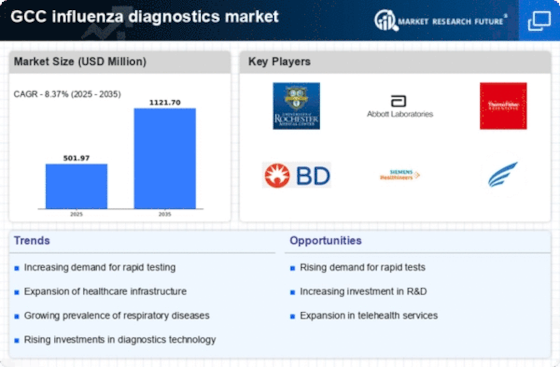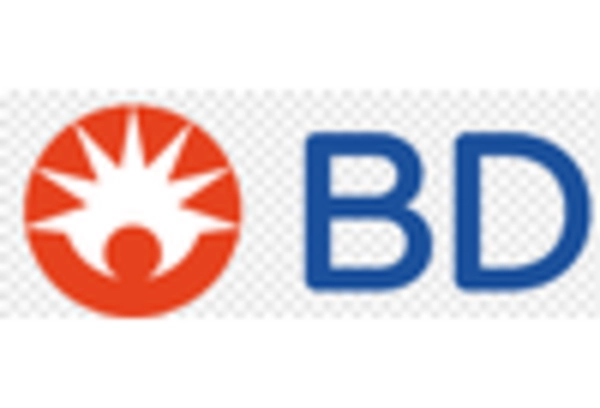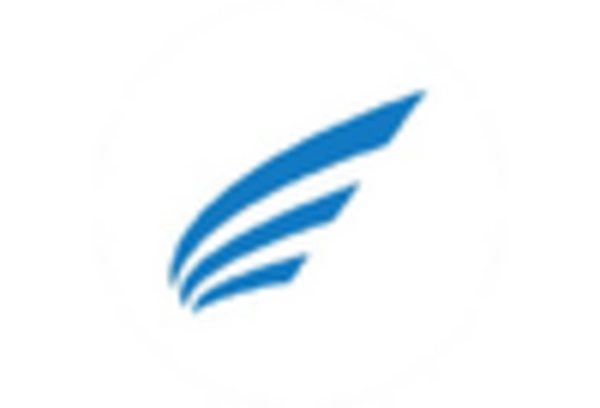Government Funding for Healthcare
Government funding for healthcare initiatives in the GCC is significantly impacting the influenza diagnostics market. Increased investments in public health infrastructure and disease surveillance systems are facilitating the adoption of advanced diagnostic technologies. For instance, the GCC governments have allocated substantial budgets, estimated at over $1 billion, towards enhancing healthcare services, which includes the procurement of diagnostic equipment. This financial support is likely to enhance the capabilities of healthcare facilities to diagnose influenza effectively, thereby driving the growth of the influenza diagnostics market. As a result, the market is expected to expand as healthcare providers gain access to improved diagnostic tools and technologies.
Rising Incidence of Influenza Cases
The increasing incidence of influenza cases in the GCC region is a primary driver for the influenza diagnostics market. Seasonal outbreaks and sporadic epidemics contribute to heightened awareness and demand for effective diagnostic tools. According to health authorities, the region experiences a surge in influenza cases during the winter months, leading to a potential market growth of approximately 15% annually. This trend necessitates the development and deployment of rapid diagnostic tests, which are crucial for timely patient management and treatment. The influenza diagnostics market is thus positioned to benefit from this rising incidence, as healthcare providers seek reliable and efficient diagnostic solutions to combat the growing burden of influenza.
Expansion of Healthcare Infrastructure
The expansion of healthcare infrastructure in the GCC is a significant driver for the influenza diagnostics market. As new hospitals and clinics are established, there is a corresponding increase in the demand for diagnostic services. The GCC countries are investing heavily in healthcare facilities, with an estimated $20 billion earmarked for infrastructure development over the next five years. This expansion is likely to enhance access to diagnostic testing for influenza, thereby driving growth in the influenza diagnostics market. As healthcare providers expand their services, the need for reliable and efficient diagnostic tools becomes paramount, further propelling market growth.
Growing Awareness of Preventive Healthcare
The growing awareness of preventive healthcare among the population in the GCC is fostering demand for influenza diagnostics. Public health campaigns aimed at educating citizens about the importance of early detection and prevention of influenza are gaining traction. This shift in mindset is likely to increase the utilization of diagnostic tests, as individuals become more proactive in seeking medical advice and testing. The influenza diagnostics market stands to benefit from this trend, as healthcare providers are encouraged to offer comprehensive diagnostic services. Consequently, the market may experience a growth rate of around 10% as more individuals opt for timely testing and preventive measures.
Technological Innovations in Diagnostic Tools
Technological innovations in diagnostic tools are revolutionizing the influenza diagnostics market. The introduction of point-of-care testing and molecular diagnostics has enhanced the speed and accuracy of influenza detection. These advancements allow for rapid results, often within hours, which is crucial for effective patient management. The market is projected to grow by 12% annually as healthcare facilities adopt these innovative technologies. The influenza diagnostics market is likely to see increased competition among manufacturers striving to develop cutting-edge diagnostic solutions that meet the evolving needs of healthcare providers and patients alike.
















